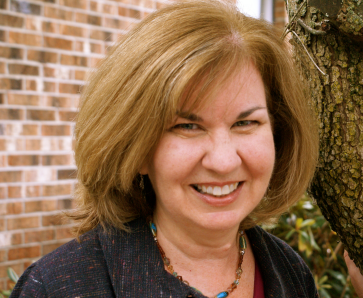
Elaine Gabovitch, MPA, director of family and community partnerships for the Eunice Kennedy Shriver University Center for Excellence in Developmental Disabilities
“Welcome ambassador” isn’t in her job description, but it certainly could be. Not only is Elaine Gabovitch, MPA, the mother of a child with an autism spectrum disorder (ASD), and a grassroots advocate for all families dealing with ASDs, she is the director of family and community partnerships at the Eunice Kennedy Shriver University Center for Excellence in Developmental Disabilities (UCEDD), and an alumna and faculty member of the Center’s Leadership Education in Neurodevelopmental Disabilities (LEND) program. Gabovitch’s multidimensional appreciation for how the Shriver Center integrates research, education and service to improve the quality of life for people with intellectual and developmental disabilities and their families fuels her passion for connecting the disability community with Shriver’s efforts on its behalf.
Gabovitch remembers the warm welcome she received when she first visited the Shriver Center as a community member. “I wanted to participate in the research they were conducting to help families like ours,” she recalled. She met LEND Associate Director Carol Curtin, MSW, research assistant professor of family medicine & community health, who subsequently became her mentor when Gabovitch applied to become a LEND fellow.
One of 42 nationwide programs funded by the Maternal and Child Health Bureau of the federal Health Resources and Services Administration, LEND trains clinical professionals and qualified family members to become leaders in creating responsive, adaptive networks that provide the services and supports that help children and families affected by ASDs and other intellectual and developmental disabilities. Upon completing the nine-month curriculum in 2006, Gabovitch was invited to become a family faculty member. “Elaine was an exemplary LEND fellow, with the perfect combination of knowledge, skills and expertise to invigorate and expand our family-centered initiatives,” Curtin said.
“We are now focused on how to create communities of care for families, children and adults with disabilities,” said Gabovitch, who teaches several LEND courses, notably Family and Consumer Perspectives, in which fellows explore the impact of a child’s disability on the family, and how coordinated systems of care support families to help children with disabilities realize their full potential.
Gabovitch also plays an integral role in the Center’s research projects. She was a key contributor to a National Institutes of Health-funded, community-based participatory research project directed by principal investigator Richard Fleming, PhD, associate professor of psychiatry, and helped establish a community advisory board of parents and professionals to inform the design of an intervention to increase physical activity in adolescents with autism. Guided by the group’s input, Shriver researchers designed a walking program at two local YMCAs.
To help ensure that the intervention would be fun for the teens, the team created the SPARC (Supporting Physical Activity and Recreation in the Community) Walking Club, complete with T-shirts, a mascot and a team cheer. “With input from families and professionals already working with physical fitness and kids with special needs in school systems and the community, we were able to make well-informed decisions so that the intervention could be meaningful and successful,” Gabovitch said.
Gabovitch is also involved with developing an online distance learning course in collaboration with Dr. Fleming. “Discovering Behavioral Intervention: An Interactive Guide to Applied Behavioral Analysis (ABA) for Parents” will help families be informed consumers of Applied Behavioral Analysis, considered the gold standard of early intervention for children on the autism spectrum. Using a highly visual, conversational approach, the course will prepare family members to monitor and advocate for the ABA services their children receive from therapists and educators.
Gabovitch collaborates with her UMMS Division of Child and Adolescent Psychiatry counterpart Celia Brown, also a parent of a child with an ASD and community liaison for the division, to recruit participants for research studies currently underway at both Shriver and the UMMS Child and Adolescent Neurodevelopment Initiative. Their joint activities include community outreach, marketing and assessing community research needs.
“We both understand the critical value of the types of disability research that UMass Medical School is doing and we are well-positioned within our communities to spread the word and raise awareness,” said Gabovitch. “There are so many ways having family members involved in our work is hugely important.”
Her colleagues concur. “Elaine is a vital team member whose skills and experience are invaluable on so many levels,” said Curtin. “Her contributions and impact are immeasurable.”
About the Shriver Center
The Eunice Kennedy Shriver Center has a four-decade history of pioneering research, education and service for people with intellectual and developmental disabilities and their families. Founded in 1970, the Center was one of 12 original Intellectual and Developmental Disabilities Research Centers established by the United States Congress, and one of the first University Centers of Excellence in Developmental Disabilities. The Center was named after Mrs. Shriver to acknowledge her essential role in the development of these programs and her life-long commitment to improving the welfare of persons with intellectual and developmental disabilities. In 2000, the Shriver Center was merged into UMass Medical School, becoming a center of excellence in intellectual and developmental disabilities within the UMMS Commonwealth Medicine program.
About Commonwealth Medicine
Commonwealth Medicine (CWM) is the public, nonprofit health care consulting and service organization founded by UMass Medical School. Government agencies, nonprofits and managed care organizations benefit from CWM’s expertise in clinical service delivery, health care financing strategies, policy management and quality improvement. Commonwealth Medicine programs have a direct and profound impact on the communities of Massachusetts and provide opportunities for UMMS faculty and students to serve the community.
Related links:
Department of Psychiatry brings hope and support to community
Tea with MDs connects community with child and adolescent psychiatry experts
A new model of community research tackles obesity in Worcester County